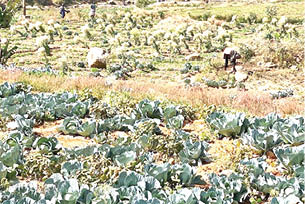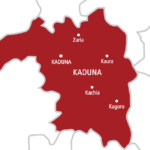Off season farming has begun, marking the start of irrigation farming in many parts of Nigeria. This method of farming which relies on an irrigation system commences soon after the rainy season.
Plateau State is one of the regions across the country where dry season or irrigation farming is particularly prevalent and farmers produce abundant harvest. The state’s fertile soil, abundant dams and favourable climate make it an ideal location for cultivating a wide range of vegetables, including tomatoes, pepper, cabbage, green beans, and many others.
Weekend Trust observes that some farmers in the farming communities in the state have begun land preparation which involve tilling, leveling, and fertilising the soil. Aside from land preparation, they also engage in installing and maintaining irrigation systems, such as pumps, pipes, and sprinklers, to supply water to the crops.
Many of them have also decided on the crops that are suitable for dry season farming; such as tomatoes, pepper, and cucumbers with many reportedly nurtured seedlings before transplanting them to the field.
- Assist poultry farmers, processors — Jega’s report
- Chinese scientists unlock key advances in sugarcane Genomics
For years, farmers in Plateau State have successfully leveraged irrigation farming to produce these crops in large quantities, contributing significantly to the state’s food supply and economy. However, this year’s prospects for irrigation farming in the state are bleak.
Current economic and emerging challenges dampening the hopes of farmers, who are now faced with unprecedented difficulties that threaten their means livelihoods.
John Chindap Wuyep, state chairman of All Farmers Association of Nigeria (AFAN), said this year’s irrigation would be faced with huge challenges among which is shortage of water in many dams in the farming communities. He said water, the most critical aspect of irrigation farming, is no longer available as it was before as many dams are drying up daily even before the season reaches its peak.
He said, “The major challenge is even the climate change itself. The sources of water are not trainable again. The cost of fuel, fertiliser and other farming inputs are contributing to the challenges faced by the irrigation farmers. People are going into irrigation because of the dams. Climate change is really a source of concern. The farming inputs such as fertiliser, pesticides and fuel are very expensive. These are likely to prevent many farmers from venturing into the dry season farming.
“If the government can do more by providing and maintaining irrigation facilities, it would go a long way. We cannot farm for three months and survive. We cannot feed ourselves with what we cultivate in three months. The issue of irrigation farming is very important because the yield is even more than in the rainy season. Government needs to add dams around.”
Samuel Azi, a farmer in Lamingo area, another farming community located in Jos North Local Government Area of the state, said irrigation farming is not going to be easy this season, explaining that pest and other diseases are on the increase by the day which could threaten the activities in the area.
Azi said, “It is not going to be easy for small scale farmers this season as it used to be, looking at the way things are. That is why, the number of irrigation farmers this time is reducing drastically. Seeds are very expensive. Pesticides and insecticides are very costly too. After harvest, if you calculate everything, there is not much gain in the business now. That is, many people are leaving the farming.
“Another thing is when you borrow money to invest in irrigation farming, there is no guarantee that you can recover all your expenses, not to talk of the gain. That is why people who are unable to pay their previous loan cannot go into this year’s dry season farming. The fuel to power pumping machine to draw the water from the river is another problem because the fuel is costly. On some occasions, farmers have to draw the water from a long distance which is an added expense compared to someone close to the river. Everything has doubled or even tripled in price now. Some farmers would have to wait till the rainy season comes to go back to the farm.
“Irrigation farming is akin to gambling – the outcome is uncertain. You’re never sure if you’ll succeed in the end. Nature may not cooperate, and even if it does, the market price of your crops is another challenge. The price of perishable commodities is unpredictable and fluctuates constantly. If you harvest your crop when prices are low, you can’t store it because it’s perishable.”
For Dauda Sunday, another irrigation farmer in the Dorowa community of Barikin Ladi Local Government Area of the state, aside from the challenges of soaring input costs, farmers are currently battling severe insect infestations. This has become a major concern in the area and is likely to impact vegetable yields in Barikin Ladi.
He said, “What’s worrisome in our area is the drought; it’s widespread. Farmers are forced to spray pesticides twice a week to control the spread of insects. If we fail to do so, the entire crop will be affected. However, many farmers lack the financial resources to effectively manage these diseases, which exacerbates our struggles. Furthermore, the market prices are unfavorable.”
Prices of perishable goods fall
The prices of commodities in the market have plummeted and the farmers are complaining about the situation considering the amount they invested and the correct price of the product in the market. They noted that aside from festive periods, crop prices are usually falling.
However, a visit to the Faringada market, a popular hub for perishable goods, revealed a downturn in prices for various crops, including cabbage, tomatoes, and beans. For instance, a basket of tomatoes sold for between N7,000 and N6,000 on Saturday, but by Tuesday, the price had dropped further. In contrast, during the Christmas celebrations two weeks prior, a basket of tomatoes sold for between N12,000 and N15,000, depending on size.
A similar trend was observed for cabbage, with a 100kg bag now selling for N15,000 to N20,000, down from the expected price of N50,000 per bag. Farmers expressed dissatisfaction with the current prices, stating that they are not profitable. For example, a 20-25kg bag of green beans, which should sell for around N15,000 on a good day, is now being sold for between N3,000 and N4,000.

 Join Daily Trust WhatsApp Community For Quick Access To News and Happenings Around You.
Join Daily Trust WhatsApp Community For Quick Access To News and Happenings Around You.


